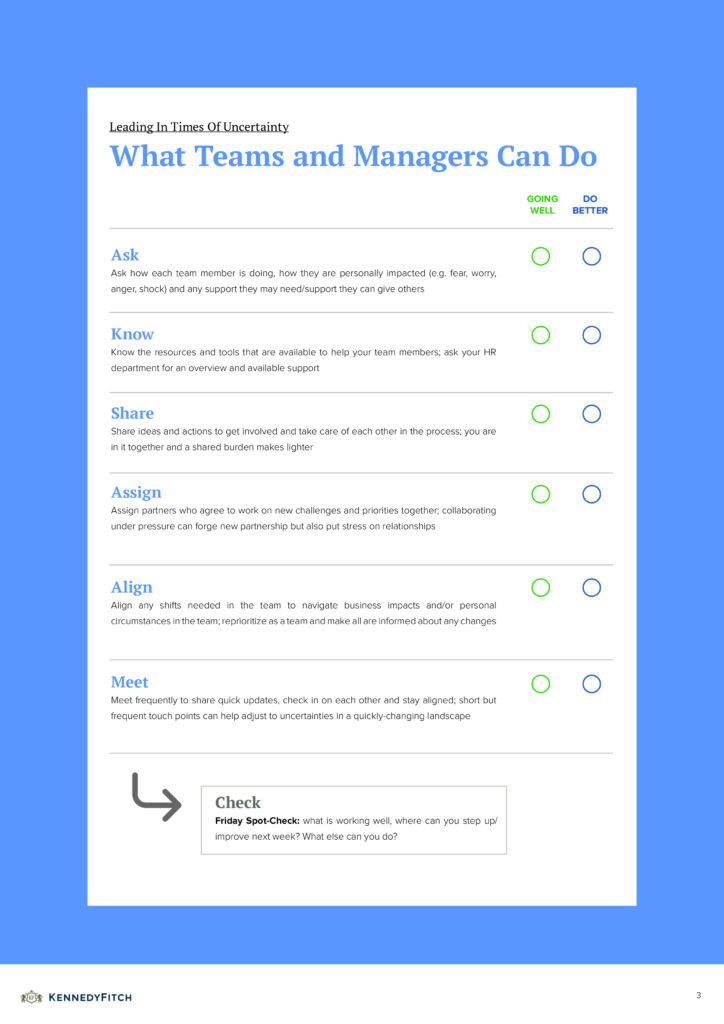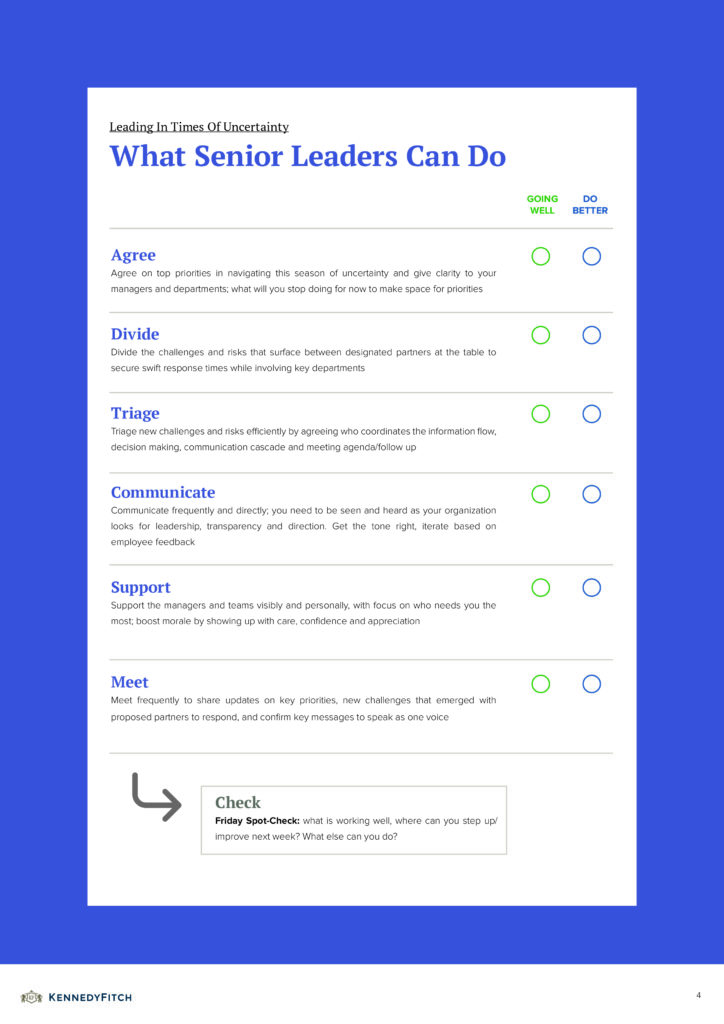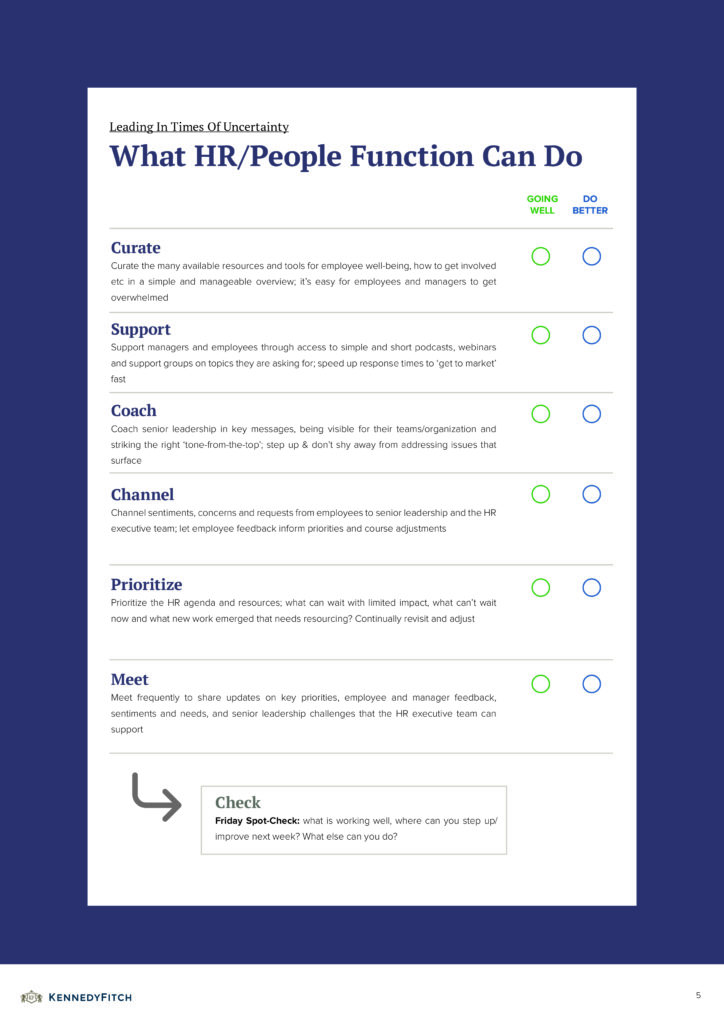With the devastation of war and the far-reaching impacts of sanctions, organizations all over the world are facing unusual circumstances. Impacts range from loss of employees due to death or resignation to fight/care for family, to business operations, financial risk/exposure, employee well-being and issues of public opinion/license-to-operate. These developments surfaced new and unanticipated uncertainties and require different strategies to navigate and adjust continually. Leadership under these circumstances is different and challenging. Specific actions can help to navigate the many uncertainties and changes that leaders and their teams are facing.
Borrowing from multiple disciplines (team effectiveness, crisis management, employee well-being, learning organizations and after/before-action reviews), and applying lessons learned from navigating the early impacts of the COVID pandemic crisis in 2020, below suggestions can support (senior) teams and HR to adjust their ways of working until a ‘new normal’ emerges and the current uncertainties/impactful changes are normalized again
As a starting point only, these suggestions will be adjusted and updated according to emerging needs, developments and feedback from managers and employees. Each organization and HR department should carefully look at their unique business context, organizational challenges and additional needs their senior leaders, managers and employees are facing – and adjust these suggestions accordingly.

Employees
What can every employee do to get involved, care for each other and stay healthy?

Teams & Managers
What can every manager do to support their team, and continually adjust as needed?

Senior Leaders
What can senior leaders do to support and enable their managers and employees, while they navigate the business challenges and uncertainties?

HR/People Function
What can the HR/People function do to support employees, managers and senior leaders?
Video message: Dr. Edith Eger
Author of “The Choice” and Auschwitz survivor
“.. I wanted to share with you a video we created for the people of Ukraine. May they keep strong and survive, so that tomorrow they can be free. With love and strength, Dr. Edie.”
How to lead in a crisis – TED Talks
Amy C. Edmondson, Oct 2020
“Humility, transparency and urgency are the keys to successfully steering an organization — big or small — through the challenges that come your way. Leadership expert Amy C. Edmondson provides clear advice and examples to help any leader rise to the occasion.”
The Conflict in Ukraine Is Causing Some Workers Severe Anxiety; Employers Can Help
Stephen Miller, CEBS on SHRM.org, Mar 2 2022
“SHRM Online has compiled a list of articles on how the crisis is affecting employees and how employers can respond.” Also see: “WAR IN UKRAINE – How Business Leaders Can Support Employees Affected by the Crisis”
How to Talk to Your Team About Distressing News Events
Allison Shapira, HBR Mar 7, 2022
“When a news event captures our collective global attention, how should we as leaders and managers address it? Your employees need you to step up right now. But it can be hard to know what to do or what to say. If you’re finding yourself at a loss, the author offers three simple steps”
Seven Lessons for Leading in Crisis
Bill George, 2009
“7 Lessons for Leading in Crisis is a concise handbook for applying proven leadership lessons in tough times: Face Reality, Starting with Yourself; Get the World off Your Shoulders; Dig Deep for the Root Cause; Get Ready for the Long Haul; Never Waste a Good Crisis; You’re in the Spotlight: Follow True North; Go on Offense, Focus on Winning Now.”
Podcast: Leadership In Crisis
PWC – Emerge Stronger Through Disruption series, September 2022
“..host Kristin Rivera and PwC Global Markets Leader Richard Oldfield explore the attributes of successful leaders in a crisis, the impact of lessons-learned on resilience, and how to emerge from the pandemic with greater employee satisfaction and clarity of purpose.”
HR for Ukraine
contact@sergiocaredda.eu
“The idea of this page is to collaboratively collect resources that can be useful, from an HR point of view, to support the people of Ukraine, looking at different options, including Relocation Support, Financial Support for the people that are still in the country, support for HR professionals and so on.”
How to Manage Wartime Stress and Anxiety
Compiled* by Dan Fallon, LPC, CEAP, Program Manager at the Wheeler Employee Assistance Program (EAP), March 3, 2022
“Since Russia invaded Ukraine on February 24, the media have been flooded with broadcasts and images of a country under siege. News about warfare and its consequences—the number of lives lost, people losing their homes, lack of food and shelter, and implications for the future—can be overwhelming and scary. As you follow news coverage about war and current events, it’s important to pay attention to how it affects your physical and emotional health. Here are some tips to help you recognize your emotions, avoid triggers, and manage anxiety”
The psychology behind effective crisis leadership
Gianpiero Petriglieri (associate professor of organizational behavior at INSEAD) in HBR, Apr 2020
“In a crisis, people don’t need a vision to inspire them–they’re already raring to act. Instead, they need what psychologists call “holding”– leaders who acknowledge their emotions and give them a sense of context and reality. Holding allows people to channel their desire to act into something purposeful, and it allows them to more fully be themselves (and thus to be more mentally healthy). People never forget how managers treated them when they were facing loss.”
4 behaviors that help leaders manage a crisis
Chris Nichols, Shoma Chatterjee Hayden and Chris Trendler in HBR, Apr 2020
“Employees thrust into leadership during a crisis need to be coached in four behaviors to be most effective in their roles. They must decide with speed over precision, adapt to changing circumstances boldly, reliably deliver despite environmental factors, and engage deeply with their teams. ”
Learning in the thick of it
Marilyn Darling, Charles Parry, and Joseph Moore in HBR, Jul/Aug 2005
“..an AAR [after-action review] should be more verb than noun—a living, pervasive process that explicitly connects past experience with future action. That is the AAR as it was conceived back in 1981 to help Army leaders adapt quickly in the dynamic, unpredictable situations they were sure to face.. By creating tight feedback cycles between thinking and action, AARs build an organization’s ability to succeed in a variety of conditions.. In a fast-changing environment, the capacity to learn lessons is more valuable than any individual lesson learned.”
Resources for Executives and Their Teams Amid Russia’s Invasion of Ukraine
Gartner, 2022
“This will be the decade of disruption.. be ready for a new reality of a multi-polar world” (Gartner Global Scenarios: Russian Invasion of Ukraine Long-term Business Impact). How can companies create strategies that help to prepare for possible scenarios?”
With special thanks to Freek Voogel, Rebecca Laun and Sarah Maher (KennedyFitch interns)
For suggestions including adding further resources please contact
Sander van Muijen, partner at KennedyFitch





